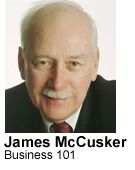 |
|
|
YOUR
COUNTY.
|
YOUR
BUSINESS JOURNAL.
|
Published April 2003
Consulting teams combine youth, experience
 Although
it has been known to happen, most businesses don’t hire consultants because
the CEO is lonely. And they don’t hire them because everything is going
so well that they can’t stand it. Consultants are brought in because a
business has a problem.
Although
it has been known to happen, most businesses don’t hire consultants because
the CEO is lonely. And they don’t hire them because everything is going
so well that they can’t stand it. Consultants are brought in because a
business has a problem.
When business managers bring in a consulting team, they usually want something they don’t already have. Very often, their first question is, as Jimi Hendrix put it, “Are you experienced?” — and what they want to know is whether the consultants bring a range of experience and expertise that they can tap into to help solve a problem.
The second thing that managers want is a fresh set of ideas and perspectives. And, rightly or wrongly, we tend to associate fresh ideas and energy with young people — and they typically have little or no experience.
Selecting a consultant, then, usually involves a trade-off, a choice between experience and youth, between proven capabilities and innovative energy.
Unless, of course, you are one of the lucky businesses that gets to bring in a consulting team from Seattle University’s Small Business Institute (SBI). With its consulting teams you get both: experience and youthful energy.
Professor Harriet Stephenson, who heads up the SBI operation, cites a wonderful example of how the combination of youth and experience helped a Seattle business — and, in a sense, saved it from itself.
As was usual, the business wanted some help in building up sales. Professor Stephenson says that “almost always, the initial desire of the firm is to increase sales. The business owner thinks, ‘If I could just get more sales, these other problems would go away.’”
This particular business was a restaurant that was close enough to the sports stadium complex south of downtown Seattle to have great crowds on game days and great, echoing empty space on the days when no game was scheduled. So, what it was looking for was a specific type of sales increase — one that would fill the unused seats on nongame days.
The students on the SBI consulting team assigned to the business began to look into how to market the restaurant in ways that would even out its revenue flow. And they came up with some really great, innovative and affordable marketing ideas to do just that.
However, when they brought the project results back for review by the team’s faculty supervisor and an outside business expert — the “experience” side of the consulting team — there was a small, but significant, change suggested.
The “experience” side liked the marketing approach but said that the students should complete their look at the restaurant’s operations and financials before implementing the new strategy.
What they found was revealing, and sufficiently alarming, to warrant a “whoa” regarding the marketing plans. The students’ in-depth review of the restaurant’s operations turned up a remarkably high cost of wasted food, resulting from “fully developing” a very diverse menu at the food preparation area. In other words, the restaurant was purchasing and preparing its meals as if every customer were ordering each menu item.
The implications of this were immediately recognized by the consulting team. As Professor Stephenson says, “If they didn’t deal with the waste and menu diversity, increasing sales would simply accelerate their pace to self-destruction.”
The combination of youth and experience on the consulting team came through for the business in this case. The restaurant ended up identifying what it had to do to straighten out its operations — and its profitability — and also got a marketing plan that would help fill its seats on nongame days.
Professor Stephenson says, “The nature of the SBI program here is that we need to be able to do an in-depth analysis of the entire operation.”
And that, of course, is how the consulting team was able to be truly helpful to the restaurant, where a narrower consulting operation, focused only on a marketing effort to increase sales, might have made things worse.
The program focuses on what Professor Stephenson calls the “triple bottom line” of people, profit and planet, which sees profits as both necessary and important — but not the end of the story.
The SBI, which is a public-private partnership between Seattle University and the Small Business Administration, has helped over 2,000 small businesses, and a good number of nonprofit organizations as well. If you think that a consulting team that combines youth and experience might be able to help your firm, call the SBI at (206) 296-5730. Whatever the problems might be at your business, it makes sense to have a bunch of smart kids, and a couple of experienced experts, take a look. It couldn’t hurt.
James McCusker, a Bothell economist, educator and small-business consultant, writes “Your Business” in The Herald each Sunday. He can be reached by sending e-mail to otisrep@aol.com.
© The Daily Herald Co., Everett, WA








